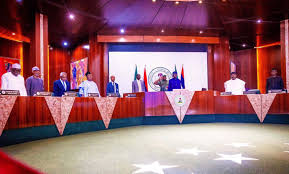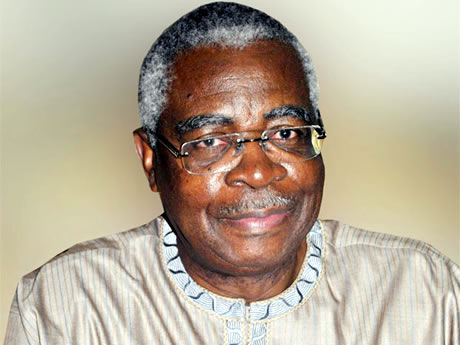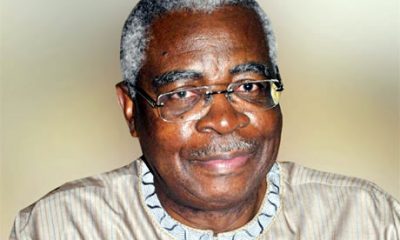NEWS
Cabinet Reshuffle: Diseowei Appeals for Calm in Niger Delta

From Mike Tayese, Yenagoa
The National Coordinator for the Good Governance Project in Nigeria, Sele Diseye has appealed to youths in the oil-rich Niger Delta region to remain calm and avoid participating in any planned protest against scrapping of the Ministry of Niger Delta Affairs by the president and economic hardship in the country.
Diseye made the appeal shortly on his arrival from Abuja at the Benin airport on Thursday.
Addressing newsmen at the airport, President Bola Tinubu was committed to revitalizing Region’s economy through prudent use of resources for the common good of the Niger Delta people.
“I understand the frustrations and challenges faced by many Niger Deltans in terms of holistic development for the region, but it is essential to approach these issues constructively.
President Bola Ahmed Tinubu is dedicated to revitalizing the region’s economy and bringing renewed hope through well-thought-out policies and programs”.He asserted that the problem of underdevelopment in the Niger Delta region was caused by these same politicians who had privileged positions to turn around the economy and massive development but rather resort to amassing wealth for their immediate families.
“Underdevelopment in the Niger Delta region is not caused by past and present presidents, but our selfish and self-made leaders who were entrusted with positions to oversee the development but turned around to steal the resources for the general good of the region in oversea banks”.
He emphasized the importance of unity and patience as the present administration is working assiduously to address the region’s diverse issues.
According to him, the purpose for which the Ministry of Niger Delta Affairs was created by Yar’Adua’s regime has been defeated by successive administrations whose positions were occupied by our people, hence the president deemed necessary to have scrapped the ministry and create new brand innovative ideas for the region to be developed.
“Now more than ever, we need to stand together and support the initiatives being put in place by the president. Our collective efforts will pave the way for a more prosperous Niger Delta”, he added.
Acknowledging the role of protests in a democracy, the National Coordinator for Good Governance Project warned against those who might exploit these events for malicious purposes.
He warned certain individuals in the South-South that find pleasure by using the innocent youths whom they ought to have provided jobs with, rather than using them for their selfish gains which has become a norm in the region”, he cautioned.
“There is total peace in the Niger Delta region and therefore youths should not allow themselves to be used by politicians who have no clear intentions to develop the region rather than using inciting statements to make their daily living”.
He called for constructive engagement and dialogue over any action that could unsettle the region currently.
Diseye said some anti-democratic politicians in the region are planning to create unrest by exploiting the recent scrapping of the Ministry of Niger Delta Affairs by the president.
“While protesting is your democratic right, consider the broader implications on our national stability and progress especially in the region. Dialogue and collaboration are far more effective solutions than creating problems that may not bring development.”
NEWS
NYSC Doctor Donates 155 Menstrual Cups to Policewomen in Jos

From Jude Dangwam, Jos
A National Youth Service Corps (NYSC) member Dr. Hope Adeyi serving at Police College Cottage Hospital in Jos, Plateau State, has donated 155 menstrual cups to policewomen, wives of police officers alongside civilian staff.
The donation was made during the “Affordable and Hygienic Menstruation for Every Woman” outreach held at the Nigeria Police Staff College on Tuesday in Jos the Plateau State capital.
According to Adeyi, “The cost of sanitary pads has risen sharply nationwide, and for many families, it has become increasingly unaffordable.
“As a result, some women are now forced to use unsafe alternatives such as old rags, tissue paper, or improvised materials.
Unfortunately, these practices significantly increase the risk of reproductive tract infections, urinary tract infections, bad odour, discomfort, and reduced confidence,” she statedThe Doctor Copper highlighted the benefits of menstrual cups, saying, “Menstrual cups offer several benefits; they are safe, reusable, and environmentally friendly. A single cup can last up to 10 years when properly cared for. They only require regular washing with clean water, which is readily available in our community.
“They greatly reduce the financial burden of buying monthly disposable pads and help prevent infections by promoting cleaner and safer menstrual practices,” she explained.
She emphasized that providing the cups is more than a donation: “By providing menstrual cups to our women today, we are not just giving a product, we are offering long‑term relief, health protection, and empowerment. This project ensures that no woman in our community has to choose between her health and affordability,” she maintained.
The initiative she said was made possible by generous sponsors, whose contributions Dr. Adeyi thanked. “Your contributions go beyond financial support—they demonstrate a deep commitment to the dignity and health of women in this community. We thank you sincerely,” she said.
The NYSC doctor urged the women present to prioritize their health and dignity noting that, “Your health matters. Your comfort matters. Your dignity matters. Today’s outreach is a step toward ensuring that every woman in this community is supported, protected, and empowered,” she emphasised.
NEWS
Mutfwang Congratulates Gen. Danjuma on 88th Birthday, Lauds His Philanthropy

From Jude Dangwam, Jos
Plateau State Governor, Caleb Mutfwang, has extended his warm congratulations to Lt. Gen. Theophilus Yakubu Danjuma on his 88th birthday.
In a statement signed by his Director of Press and Public Affiars Gyang Bere and made available to Newsmen on Tuesday described Gen.
Danjuma as “a symbol of excellence, an exemplary philanthropist, and a symbol of hope whose life has been wholly devoted to the defence, progress, and upliftment of humanity”.Mutfwang praised Gen. Danjuma’s outstanding contributions to national life, citing his courageous military service, visionary business leadership, and transformative philanthropic work.
“You remain a priceless national asset and an extraordinary achiever who has enjoyed uncommon grace from God to lead, to serve, and to excel in diverse spheres of human endeavour,” he stated.
The Governor also highlighted Gen. Danjuma’s commitment to improving the lives of vulnerable Nigerians through the TY Danjuma Foundation, which has become a lifeline to underserved communities nationwide.
Mutfwang on behalf of his family, the government, and the people of Plateau State wished Gen. Danjuma long life, sound health, renewed strength, and divine wisdom as he continues to offer wise counsel and mentor younger generations.
CRIME
Enugu Police Arrest 25-Year-old Man over Alleged Kidnapping, Armed Robbery

From Sylvia Udegbunam, Enugu
Operatives of the Enugu State Police Command attached to the New Haven Division and the Distress Response Squad (DRS), on 6th December 2025 at about 6 a.m., swiftly responded to a distress call and arrested one Orlu Chukwuemeka (male, 25).
Investigations revealed that the suspect and his accomplice, who is currently at large, disguised as commercial operators of an unregistered white mini bus and abducted their female passenger in a one-chance-styled operation at Fourth Dimension, along Chime Avenue, Enugu.
During the incident, the suspects stabbed the victim, pushed her out of the moving vehicle along the same Chime Avenue, and escaped, after robbing her of an Android phone and ATM card.
Police operatives immediately trailed and intercepted them within Independence Layout, Enugu, leading to the arrest of Orlu, while the other suspect fled.Ina press statement sent by the Police public relations officer Enugu State Command, Daniel Ndukwe stated that the victim was promptly taken to the hospital for medical attention, where she regained stability and was able to positively identify the arrested suspect as part of the criminal gang.
The suspect has since been arraigned in court and remanded in custody, while intensive efforts are ongoing to track down the fleeing accomplice and ensure every person involved is brought to justice.
The Commissioner of Police, Mamman Bitrus Giwa, appreciates the timely support from public-spirited citizens that aided the swift arrest. He reiterates the Command’s unwavering resolve to combating violent crimes across Enugu State this festive season and beyond, urging residents to continue providing credible and timely security information.


















